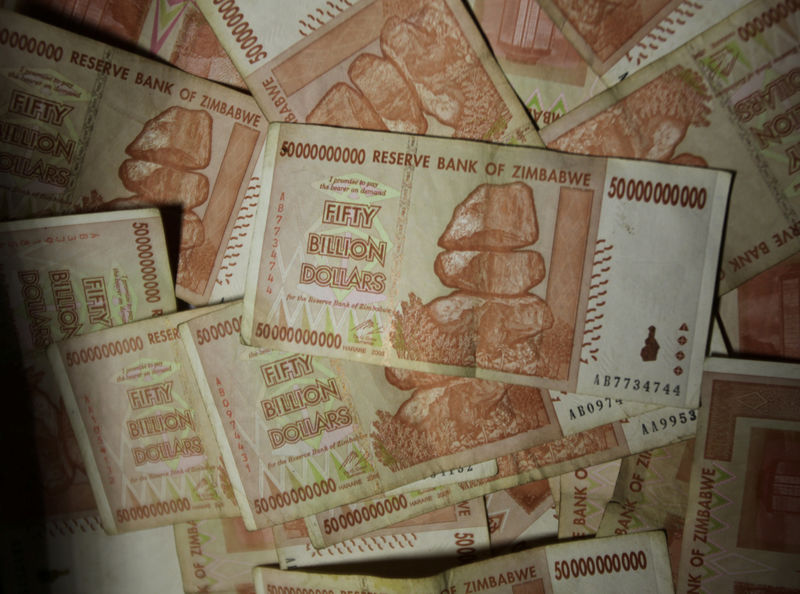By MacDonald Dzirutwe
HARARE (Reuters) - Zimbabweans are worried that central bank plans to circulate local bank notes to ease dollar shortages could open the door to rampant printing of cash as happened in 2008 when inflation hit 500 billion percent, wiping out savings and pensions.
Since January 2009, the southern African country has used foreign currencies, including the U.S. dollar, British pound and Chinese yuan after dumping its unloved currency that came to symbolise a decade of economic collapse.
Since March however, the economy, grappling with a devastating drought, has faced a shortage of notes, unnerving depositors who fear the Reserve Bank of Zimbabwe (RBZ) turning on the printing presses again will make their cash worthless.
In an effort to ease the shortage, the central bank last week also set priorities for imports and imposed limits on cash withdrawals.
"This is the return of the Zimbabwe dollar by another name," said Shingirai Mhondiwa, 44, who runs a phone repair shop in Harare and is bitter after losing his job in 2008 as an accounts clerk at a plastic manufacturing firm, as well as his savings.
"I do not want to experience that again, so I am taking all my money no matter how long it takes. What will stop RBZ from printing more money than they should?" asked Mhondiwa, as he joined a short queue at a cash machine outside a bank.
Mhondiwa is not the only one losing faith. Some commercial banks have set daily cash withdrawal limits at $50, way below the $1,000 imposed by the central bank as part of the measures.
An official at a Harare-based investment firm reported a five-fold jump in the number of individuals liquidating their investments in the week after the central bank's new measures.
To try to calm jitters that more money would be printed than is required, the RBZ plans to contract a German printer and keep the value of the new notes below $200 million or 4 percent of the total deposits held by banks.
The notes, expected in two months, will be backed by a $200 million bond from the African Export and Import Bank and will be at a par with the dollar.
Central bank governor John Mangudya told reporters he sympathised with Zimbabweans, adding that "the fear factor is very high" because of what happened in the past.
"PAINFUL MEMORIES"
The Bankers Association of Zimbabwe and manufacturers have given their support to the printing of new notes and curbs on imports. But many are still sceptical.
The RBZ acts independently, but after past experiences, there are doubts whether the bank can resist if pressured by the government to print more money, especially ahead of the next elections in 2018.
"I am afraid we will be left holding on to useless bank notes again. I will keep my U.S. dollars under my pillow, at least I know it will not lose value," said mother-of-three Theresa Jabangwe, 33, who sells canvas bags outside a Harare supermarket.
Barber Takesure Manomano echoed her concerns: "Surely the RBZ should know that the Zimbabwean dollar brings back painful memories to many of us. Have they run out of ideas?"
Lovemore Kadenge, of the Zimbabwe Economics Society, said the measures would make people question whether to deposit remittances and other cash into banks: "It is an issue of trust and what this will do now."
President Robert Mugabe's rivals say cash shortages and printing of new notes show his inability to steer the economy. The government blames Western sanctions and drought and has promised major reforms to woo back foreign lenders.
Cash shortages have also delayed raw material imports for some mines, farmers and manufacturers.
"Our biggest problem is delays in payments for raw materials. Consequently this will impact our production cycles," said a mining executive who declined to be named.
Under the new rules, exporters would be paid a 5 percent bonus in local notes, which can be exchanged for dollars and will be circulated in the economy.
On Tuesday, the central bank backtracked from last week's decision to convert half of all export earnings into euros and rand, a flip-flop that will hardly re-assure a nation that has little faith in the authorities.
South African-based NKC African Economics said the cash shortages showed a country on the brink of a currency crisis, adding this could cause instability at a time of high tension in Mugabe's ZANU-PF over who will succeed the 92-year-old ruler.

"Zimbabwe has faced serious crises before, but not with such a divided ruling party and so few ideas on how to proceed," NKC said in a note to clients.